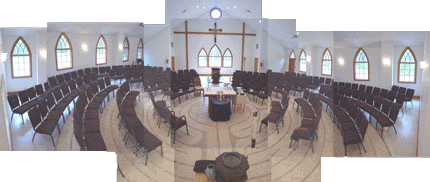Habits, skills, and attitudes
 Through a bit of serendipity common to the Internet, I ran across The Rev. Andrew J. Archie's annual report to the Church of St. Michael and St. George in St. Louis, Missouri. He asked his congregation to consider what he felt to be the most important question for a church:
Through a bit of serendipity common to the Internet, I ran across The Rev. Andrew J. Archie's annual report to the Church of St. Michael and St. George in St. Louis, Missouri. He asked his congregation to consider what he felt to be the most important question for a church: What are the habits, skills, and attitudes needed to be a disciple of Jesus Christ and to be able to share those habits, skills and attitudes with others.He goes on to compare this task of discipleship to baseball
Think of what it is like to learn to play baseball. By throwing the ball time and time and time again, one learns how to catch a ball. And catching a ball gives you the ability to throw someone out at first base and throwing someone out a first base relates the whole pattern and purpose of playing baseball. To know what baseball is all about, you have to play baseball. It takes more than a television.And then after a helpful comparison with a chemistry teacher who gets her students to think like a chemist, he writes
And so the question is not, "Will some community have its way with us?"—for some community inevitably will. The question is, "Will the community that forms us and identifies us be true or false?" We live in a world that tells that faith is personal, particularly Christianity, and therefore that being faithful requires no special skills. And if faith is personal then it is optional. And so being faithful consists of having nice, loving thoughts about God. The idea that being faithful requires a discrete set of practices that forges a distinct way of being in the world that godly habits and practices, like an athlete's training, are more geared to developing abilities than a set of thoughts is strange. These habits and practices are what give us a real glimpse of the Lord and make us more than a social organization sustained by the amount of fellowship and good feeling in the congregation. The Christian faith draws the believer into a new, alternative world. And this new alternative world does not work the way the world as we know it works.The Annual Report is a bit long to quote in full here, but it is worth a read, if you want to follow this link (did you notice the subliminal advertising in that link text?).
What do you think? Does faith require skills developed over time? If not, where might the annual report have gone astray on discipleship? If so, what might be the habits, skills, and attitudes needed to be a disciple of Jesus Christ? And how does (or how can or should) a church convey those to others?








0 Comments:
Post a Comment
<< Home